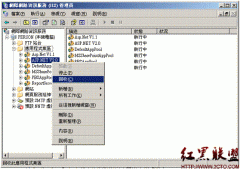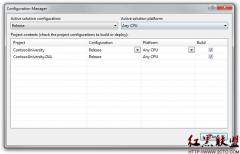测试MVC之Mock HttpContext
在Web 中进行测试驱动的开发,比较大的困难是模拟HttpContext ,它太复杂了。
moq 框架提供了强大的模拟能力,但是,模拟一个HttpContext 对象还是需要自己来动手。
为此,我自己写了一个方法来完成这个工作。其中,还顺便使用Log4Net 来输出一下它的工作情况。
view sourceprint?
01 /// <summary>
02 /// 创建上下文模拟对象
03 /// 至少需要支持
04 /// Request 中
05 /// AppRelativeCurrentExecutionFilePath,
06 /// ApplicationPath
07 /// PathInfo
08 /// Response 中
09 /// ApplyAppPathModifier
10 /// </summary>
11 /// <returns></returns>
12 private Moq.Mock<System.Web.HttpContextBase> CreateHttpContext()
13 {
14 log4net.ILog log = log4net.LogManager.GetLogger("CreateHttpContext");
15
16 string ApplicationPath = "/";
17 string PathInfo = "";
18 string AppRelativeCurrentExecutionFilePath = "~/";
19
20 var contextMock = new Moq.Mock<System.Web.HttpContextBase>();
21
22 contextMock
23 .Setup(c => c.Request.AppRelativeCurrentExecutionFilePath)
24 .Returns(AppRelativeCurrentExecutionFilePath)
25 .Callback(() => log.Info("Calling AppRelativeCurrentExecutionFilePath"));
26
27 contextMock
28 .Setup(c => c.Request.ApplicationPath)
29 .Returns(ApplicationPath)
30 .Callback(() => log.Info("Calling ApplicationPath"));
31 contextMock.Setup(rc => rc.Request.PathInfo)
32 .Returns(PathInfo)
33 .Callback(() => log.Info("Calling PathInfo"));
34
35 contextMock
36 .Setup(rc => rc.Response.ApplyAppPathModifier(Moq.It.IsAny<string>()))
37 .Returns((string s) => s)
38 .Callback((string s) => log.InfoFormat("Calling ApplyAppPathModifier: {0}.", s));
39
40 return contextMock;
41 }
虽然这个方法已经能够完成我需要的测试,但是,我希望能将它提炼一下,得到一个更加通用的Mock 方法。
很快,我发现这个工作已经在很久以前被Scott Hanselman 介绍过一次了,其中甚至还写了不同的Mock 框架下的提供方法。不过moq 版本的作者不是他,而是另外一个人Daniel Cazzulino, 这�
- 发表评论
-
- 最新评论 进入详细评论页>>



